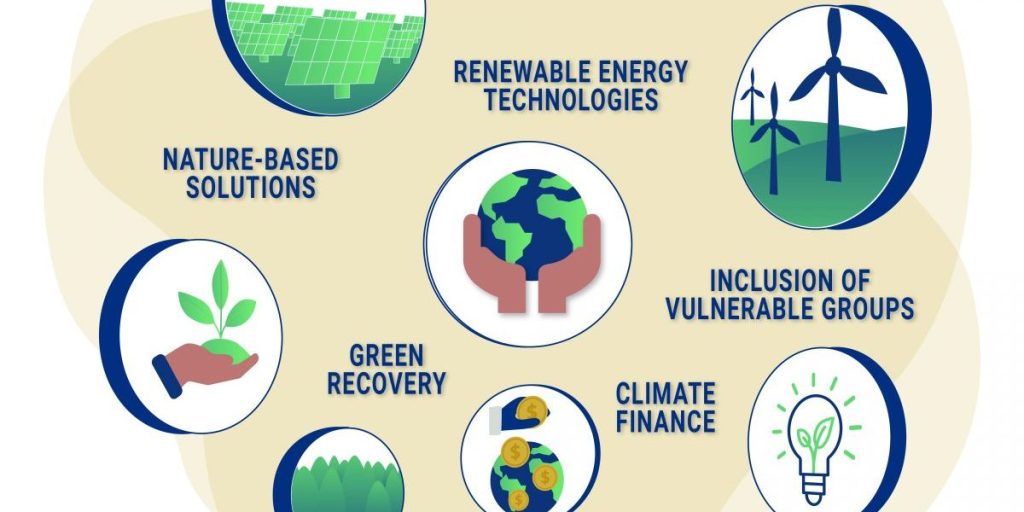Harnessing Nigeria’s Renewable Potential on Mother Earth Day
- April 22, 2025
- Posted by: Hub Admin
- Categories: Article, Climatic Justice, Environmental Protection, Latest News & Events

By Pamela Udejimba
This year’s International Mother Earth Day, themed “Our Power, Our Planet,” reminds us that the planet is our home and of our collective agency to protect it. As UN Secretary-General António Guterres stated, “Mother Earth is running a fever.” This is a call to action that, more than ever, we need a shift to a more sustainable economy that works for both people and the planet.
Nigeria is rich in natural energy sources like solar, hydro, wind, and geothermal energy. The amount of sunshine that some parts of the country get is among the highest in West Africa. Our rivers have the potential to produce far more electricity than we currently generate from them. And the strong winds in the north are perfect for wind turbines. Despite all this potential, we still depend heavily on fossil fuels like diesel and gas, which pollute and degrade the environment, mainly because of policy implementation gaps.
Socio-Economic Benefits and Implementation Challenges
Transitioning to renewable energy is not just beneficial for the environment; it also offers several socio-economic benefits. Today, many renewable technologies are cheaper to run than those that rely on fossil fuels. Plus, the renewable energy sector in Nigeria already provides thousands of jobs, from selling solar panels to installing solar systems in homes and businesses. Cleaner energy also yields significant public-health benefits, mitigating respiratory and cardiovascular diseases.

However, there are still some major challenges. The national electricity grid is not yet equipped to efficiently support different types of renewable energy, making it difficult to integrate solar, wind, and other sources into the system. Financing remains a major challenge, as high interest rates and economic uncertainty make it risky and expensive for investors to commit to large-scale projects. There is also a shortage of skilled professionals in areas like engineering, project management, and system maintenance, which affects the smooth operation of renewable systems. Additionally, some renewable projects have faced delays or cancellations due to local resistance, often because communities were not properly engaged or consulted during planning. Frequent changes in policies, especially those related to electricity pricing and foreign exchange, further increase the risks for developers and investors.
Way Forward
It is important to note that even with all the natural resources in the world, there will be no progress in the right direction without the right support systems. The government has set ambitious targets for how much of our energy should come from renewables by 2030, but we need to effectively take practical steps to get there. These include streamlining permitting procedures, providing transparent feed-in tariffs, tax incentives and concessional financing schemes to attract private investment. Strengthening the capacity of regulatory bodies such as the Nigerian Electricity Regulatory Commission (NERC) and the Rural Electrification Agency is critical for certificate issuance and compliance monitoring. Public-private partnerships, supported by clear contractual arrangements, can support foreign capital while protecting local interests. Moreover, aligning our clean energy goals with international climate efforts reinforces accountability and access to international climate finance.
To truly transform the energy system, Nigeria also needs to modernise how electricity is delivered. This includes using smart meters to track electricity use more accurately, improving how power is distributed, and expanding the grid to underserved areas. At the same time, more training programmes in technical colleges and universities are needed to prepare people with the skills required to build and maintain renewable energy systems. It is also important to support inclusive business models such as pay-as-you-go solar plans and community investment schemes that make clean energy more affordable and ensure that local communities benefit. Better data on energy resources and how well projects are performing will help shape smarter, evidence-based policies. Furthermore, working with neighbouring West African countries to share power resources can help balance supply and make the entire region’s energy system more stable.
By aligning our natural resources with inclusive governance and supportive institutions, Nigeria can lead the way toward a resilient, low-carbon future, one where our Earth is matched by our collective power to protect and sustain it.
Leave a Reply Cancel reply
Thematic Areas
We value your feedback, inquiries, and any messages you’d like to share with us.
Please don’t hesitate to reach out through the provided contact information, and we’ll be glad to assist you.
